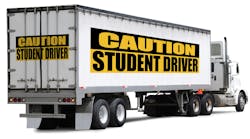A labor union and two safety advocacy groups have asked a federal appeals court to order the Federal Motor Carrier Safety Administration (FMCSA) to issue a final rule setting minimum standards for entry-level training of commercial vehicle drivers.
The petition for a writ of mandamus was filed Sept. 18 in the U.S. Court of Appeals for the District of Columbia Circuit. The groups seeking the action are the Advocates for Highway and Auto Safety, Citizens for Reliable and Safe Highways (CRASH), and the International Brotherhood of Teamsters. Public Citizen is representing the groups in court.
The DC circuit court has already told FMCSA once before that it had to issue new rules. In December 2005, the appeals court ruled that FMCSA’s 2004 driver training regulations did not adequately meet the requirements Congress had established in 1991 when it ordered the Federal Highway Administration, which regulated motor carriers at the time, to issue minimum standards by 1993. (For more on the tangled 21-year history of the entry-level driver training standards rule, click here.)
The latest lawsuit could shatter any hope that FMCSA can use regulatory negotiation among stakeholders to adopt the long-overdue regulations as the agency said last month it was considering. The chances of that approach working appeared slim from the start as the various parties were so far apart on what they consider to be acceptable regulations on driver training.
Although the Owner-Operator Independent Drivers Assn. is not a party to the lawsuit, it, too, has criticized FMCSA for failing to adopt training standards. In June, OOIDA urged the agency to focus on driver training standards instead of worrying about electronic logs or changes to the hours-of-service regulations.
Still, OOIDA does not agree with the lawsuit. “While we share the desire for action sooner rather than later, it is important to get a solid and complete training rule in place to have an impact on improving safety, as opposed to just existing on paper,” OOIDA spokesperson Norita Taylor told Fleet Owner.
If there’s one area of common ground among all stakeholders it’s that the question of driver standards needs to be resolved.
“Tougher entry level driver training standards are needed,” Dave Osiecki, executive vice president of the American Trucking Assns., told Fleet Owner. “ATA, truck driver groups, training organizations, and FMCSA all agree on this point.”
And ATA doesn’t seem to be giving up completely on the idea of a negotiated rule.
“FMCSA is now evaluating a different process to develop a rule that has real safety benefits commensurate with costs likely to be imposed,” Osiecki said. “ATA looks forward to working with affected stakeholders on a meaningful, cost-beneficial rule.”



